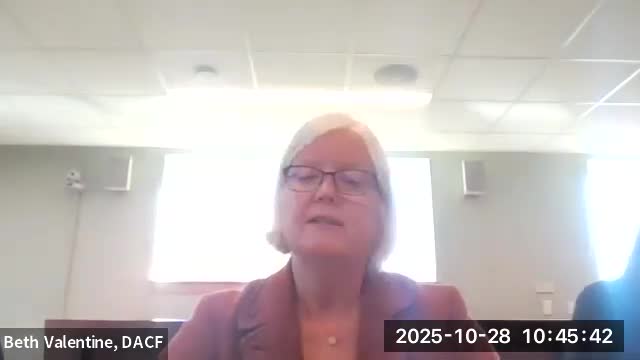DACF hearing on PFAS fund rule amendments spotlights mental-health eligibility for producers
Get AI-powered insights, summaries, and transcripts
Subscribe
Summary
At a public hearing on proposed amendments to DACF rule chapters 400–408, a Department official urged broadening eligibility for mental-health services tied to PFAS impacts on farms; the department is taking written comments through Nov. 7, 2025.
Augusta, Maine — The Maine Department of Agriculture, Conservation and Forestry held a public hearing Oct. 28 on proposed amendments to DACF rule chapters 400 through 408 governing administration of the PFAS Fund, and a department official urged expanding eligibility for mental-health services for PFAS-impacted producers.
Beth Valentine, director of the PFAS Fund, opened the hearing and said the proposed amendments “are intended to improve clarity, facilitate implementation of the PFAS Fund, and align the PFAS Fund's appeal procedures with DACF's departmentwide appeal procedures defined in rule 1,001 CMR chapter 8.” Valentine said the hearing was publicly noticed Oct. 7 on the department website and advertised the same day in statewide newspapers, including the Kennebec Journal and the Portland Press Herald. She reminded attendees that written comments are due by 11:59 p.m. on Nov. 7, 2025, to beth.valentine@maine.gov or mailed to 22 Statehouse Station, Augusta, ME 04333.
Megan Hennessy, director of the PFAS Response Program at the Maine Department of Agriculture, Conservation and Forestry, testified in person and urged the department to broaden who can access mental-health supports that the PFAS Fund may provide. “I understand that the fund's mental-health support programs are still in development,” Hennessy said. “Before they are implemented, however, I want to suggest that the current eligibility criteria are too strict to inclusively support the needs of the current and future PFAS-impacted producers engaging with the PFAS Response Program.”
Hennessy noted that eligibility in the draft rules is tied to an exceedance of Maine’s enforceable drinking-water standard or the state soil remedial action guidelines (RAGs) for residential use established by the Maine Department of Environmental Protection, or to any PFAS soil screening level established by the Maine Center for Disease Control and Prevention for farm workers. She said there are instances where lower levels of PFAS in soil require reassessment of farm practices and products and that such reassessments can cause “anxiety, stress, and more.” Hennessy asked the department to broaden eligibility so producers in those situations can access supportive mental-health services.
Valentine outlined hearing procedures and said she and PFAS Fund management specialists Melissa Hamon and Sarah Wilcox were present to receive testimony. The hearing began late; Valentine said everyone who signed in by 11:30 a.m. would have an opportunity to speak and that the record would remain open through the written comment deadline. She also said the department will accept written testimony even from those who spoke at the hearing.
The hearing was otherwise brief: Hennessy was the only in-person speaker to offer substantive testimony during the recorded session; department staff invited virtual attendees to use the chat/Q&A features and to submit written comments if they preferred not to speak.
Next steps: The department will receive written comments through Nov. 7, 2025, and will consider comments as it finalizes any rule changes to DACF chapters 400–408, including any revisions to eligibility criteria for mental-health supports under the PFAS Fund.
